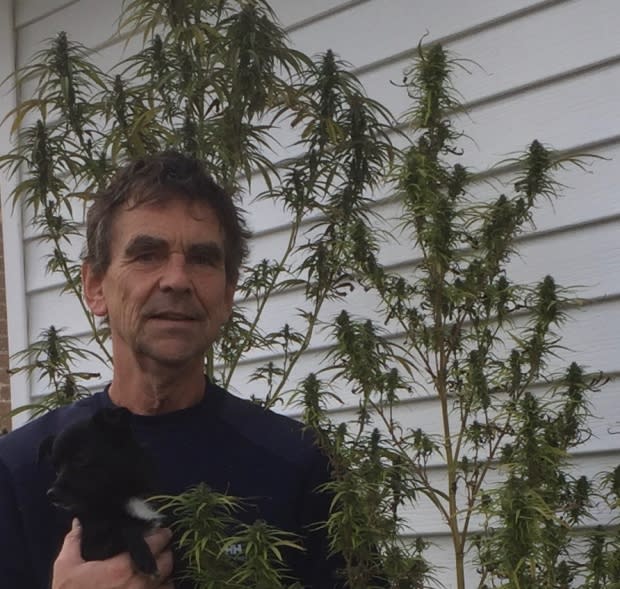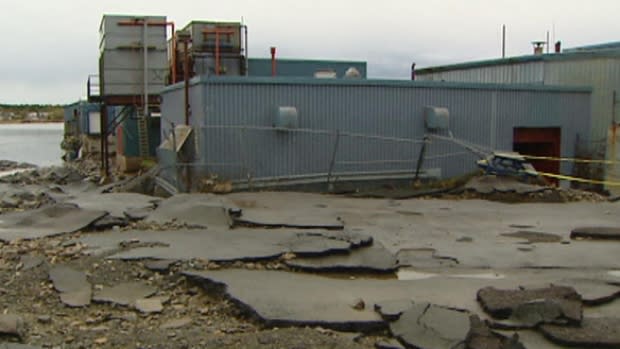Pot offers new hope for rural towns hurt by decline of the fishery
With legal cannabis a growing industry in the country, and edibles about to become available in the fall, lots of prospective businesspeople are trying to get a piece of the action.
In rural Newfoundland, there's a trend happening in the industry.
Former fish plants that have been shuttered for lack of product turn out to be perfect for growing pot.
There aren't that many large buildings available for food production in rural Newfoundland, and cannabis counts as food under federal regulations because it's consumed. Many of them have three-phase power, which is needed in industrial buildings, a reliable source of water and lots of growing space.

In Fair Haven, Bond Rideout bought the plant to process fish in 2006 and then decided to switch to cannabis after he was approached to apply for a grow licence by Health Canada and encouraged by the RCMP.
He's focusing on producing cannabis for medical use.
"The medicinal side in my opinion is much more beneficial to society in general, but it's also much more lucrative too from a business perspective. And that's being mitigated right now through the easiness and accessibility of the recreational market," he said.
Chris Snellen, who owns the former Ocean Choice International shrimp plant in Jackson's Arm, has applied to Health Canada for a licence to grow pot for edibles. However, there's a long regulatory process to pass through before approval.
"Our experience in New Brunswick was we waited 3½ years there. But we did get it," Snellen said with a laugh.

Rideout has already met the most of the approval requirements.
"The regulations have changed so many times now since I started at it, it'd be almost folly to tell you what they are," he said.
"They used to change almost daily. As soon as there was a change in government or somebody woke up on the wrong side of the bed, there seemed to be a new regulation we had to adhere to and follow."
A couple of years ago, he said, approval was a nine-stage process, with different requirements at every step.
"Stage 4, if memory serves me correctly, the owner had to not have a criminal record. You had to do your security checks."

Rideout even had to submit the light bills from any buildings he owned to prove he wasn't powering an illegal grow-op.
Snellen says he's likely going to have to use his plant for other purposes if he hopes to make any money before the pot licence comes through.
"Well, we used to run a lettuce farm here in St.John's so all that equipment will be going there," he said. "And we'll set up some small-scale food production while we're waiting. We'll be working on a water-bottling line."
They're also considering infusing an extract of chaga — a fungus that grows on birch trees in the area — into a beverage as well.

In Port Union, the shrimp plant was seriously damaged during Hurricane Igor in 2010 and never reopened. A new owner has applied for a licence to grow pot there.
The mayor, Shelley Blackmore, says the new application isn't going as smoothly since the recent implementation of a new rule that says renovations on a building have to be complete before approval.
A fourth application from the owner of the former High Liner plant in Burin — which used to make Filet-O-Fish patties for all the McDonald's restaurants in Canada before it closed in 2013 — is before Health Canada as well.

But pot production won't replace the hundreds of jobs lost in rural Newfoundland and Labrador in the last eight years.
Numbers provided by the provincial government tell us in 2010, there were 102 primary production fish plants. Last year, that number was down to 69.
Still, Chris Snellen says every bit of employment in those communities helps.
"That plant used to employ around 300 people so I don't think it'll ever see that. But we'd be tickled pink with five or six jobs, you know. And I think the town would be too. They're pretty supportive and any kind of job activity is … it's pretty quiet down there these days."
Provincial government not much help
Rideout says the provincial government could do a lot more to help local growers get rural operations off the ground.
"You know, our province is always saying Newfoundland is ready for business," he said. "There's no bigger lie that's ever been said. We're simply not ready for business. When you're talking about doing big business or big industry in rural Newfoundland, you find yourself cut off at the heels."
He points to the government's decision to offer Ontario-based Canopy Growth $40 million in tax remittances in exchange for the company's agreement to build a production facility in the province while local entrepreneurs struggle on their own.
Using my tax dollars to fund my competition, that's crazy. - Bond Rideout
"I've got millions tied up in this industry now," he said.
"This is just money in, money in, money in with nothing coming back. And then your government stepping on your feet along the way."
He said he doesn't mind competitors entering the market.
"But using my own tax dollars to fund my competition, that's crazy," he said.
"I love competition, and if Tweed (Canopy Growth's provincial subsidiary) wants to come in on there own wherewithal and build a building next door to me, rock and roll all day long. I'll fight you on a business-to-business level. But don't stack the deck against me."
While frustrated with the licensing process, Snellen still views the industry with a sense of humour. In planning a name for his product, he's thinking of "Sea Weed." And he says his plant's location on Route 420 — slang for cannabis or its use — is marketing gold.
People who need work in rural fishing communities hope he's right.
Read more from CBC Newfoundland and Labrador

